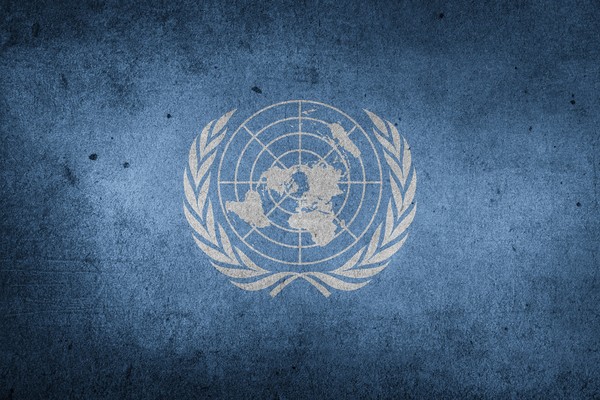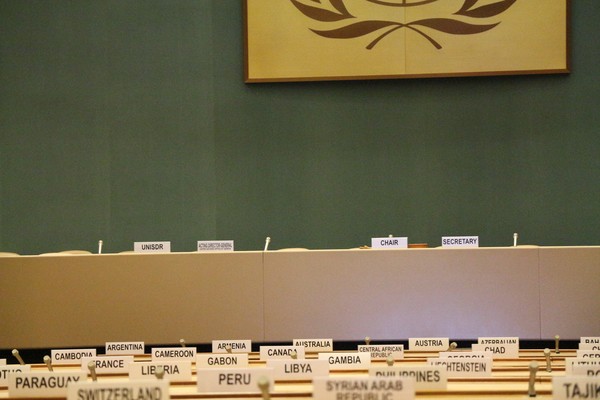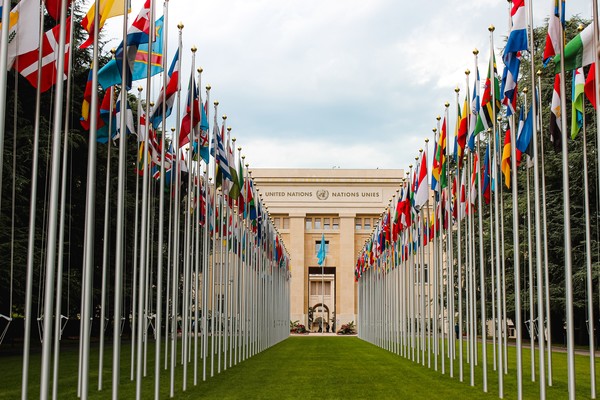The failures of the Security Council in the limelight

THE UNITED Nations Security Council (UNSC) is the United Nations’ (UN) most influential body, having been an ever-present key player in world affairs since the end of World War II (WWII) in 1945. The council is mainly responsible for the preservation of international peace and security. To accomplish such hefty duties, the UNSC has a broad range of powers including conducting peacekeeping operations, enacting international sanctions, mandating cease-fires during conflicts, and authorizing military action. Additionally, of the six bodies of the UN, the UNSC is the only organization with the authority and influence to impose binding resolutions on member countries. However, despite its commendable goals and corresponding capabilities, there is a lack of trust in the UNSC’s ability to implement tangible change in conflict-ridden nations. The world has constantly witnessed the political biases of permanent members interfering with the introduction and passing of necessary resolutions. With the UNSC’s most recent failure to condemn Russia for its role as the aggressor of the brutal war in Ukraine in February of 2022, worldwide outrage and protests about the organization’s incompetence have prompted the public to question the practical authority of the council and its role in maintaining world peace, especially given its numerous past failures in Ukraine, Syria, and Yemen.
How does the Security Council operate?
The UNSC is a distinct organization with a somewhat unique setup[1]. The council has ten rotating member states and five permanent members. The rotating members are elected every two years on a regional basis. The five permanent states, Russia, China, France, the United Kingdom (U.K.), and the United States (U.S.), are given veto power, which allows them to block any resolution. These members occupy such influential positions because they were the obvious victors of WWII and are all nuclear states. Recently, the UNSC’s permanent members have faced severe criticism due to the council's lack of action against Russia’s invasion of Ukraine[2]. One day after the war started, the UNSC introduced Resolution 14808, which demanded Russia immediately halt its invasion of Ukraine and withdraw all troops. Russia’s veto of the resolution faced worldwide condemnation and raised doubts about its place in the UNSC.
The composition of the UNSC’s permanent members is highly contested. Critics argue that the council is still operating in the geopolitical atmosphere of 1945 and is ignorant of rising powers in this new age[3]. For example, Germany and Japan are powerhouses that have been rebranding themselves after their antagonistic roles in WWII. Despite their genuine transformation of national identity and their calls for reforms regarding the council, the two states have not been seriously considered for permanent seats on the UNSC. Daryl Bockett (Prof., Int. Studies) believes that “the current five UNSC countries will not agree to dilute their power and give up their privileged positions by adding more permanent seats,” meaning that the implementation of reforms remains unlikely.
Even if the UNSC tried expelling a member, it would not work logistically. For example, any resolution to expel Russia as a permanent member of the UNSC will be subject to a vote by existing members and will most likely be vetoed by Russia. Hence, most experts agree that Russia’s removal from the council is highly improbable because Russian consent would be needed to expel itself from the council, showcasing the UNSC’s inability to hold member states accountable.
The ongoing Ukraine-Russia war and veto power
This is not the first time doubts have been raised about the UNSC's ability to counter Russian aggression. It started with the Russian annexation of Crimea, which is Ukrainian territory[4]. In February of 2014, soldiers in unmarked uniforms overthrew the Crimean Parliament and occupied strategic locations such as airports and military bases on Russian President Vladimir Putin’s orders. Putin then installed a pro-Russian government in the Crimean Parliament which held a referendum, asking the people in Crimea to vote on whether they wished to gain more independence from Ukraine or become a part of Russia. According to numbers provided by Russian authorities, there was an 83% voter turnout, and 97% of the voters voted to integrate Crimea into Russia. Using the referendum as justification, Putin formally declared Crimea part of Russian territory a day after the vote.
Despite most countries considering Crimea to be illegally occupied by Russia due to it influencing the referendum, the UNSC failed to officially recognize the occupation as a violation of international law[5]. The proposed 2014 resolution on this issue would have demanded that the referendum be considered invalid, emphasizing Ukraine’s sovereignty and national borders. However, this resolution was not adopted by the council due to Russia’s veto, despite 13 members voting “yes” and China abstaining. Moreover, due to Russia’s veto, the UNSC did not deploy any peacekeeping forces to Crimea and did not investigate alleged war crimes committed by Russian forces.
Russia’s veto on the Crimea resolution was particularly concerning because violating the borders of a sovereign nation goes against the UN Charter––international law that Russia as a UN member state has to abide by. Essentially, Russia vetoed international law, and its recent veto against Resolution 14808 concerning its military infringement of Ukraine further sets a dangerous precedent[6]. In addition, the covert political alliance between Russia and China was on full display at the March 23, 2022 UNSC meeting. Russia introduced Resolution 14838, which acknowledged Ukraine’s growing humanitarian crisis without naming Russia as the cause of said crisis. This resolution was met with swift disapproval, with 13 members abstaining and China being the sole affirmative vote. China’s support for a resolution that seemingly absolves Russia of any blame speaks to how China and Russia’s political alliance supersedes the purpose and goals of the UNSC. On China and Russia’s memberships in the UNSC, Bockett states that it would hypothetically be possible to expel the states by voting on their membership status after excluding Chinese and Russian ambassadors from a UNSC meeting. However, in doing so, many other countries would “not recognize the authority and legitimacy of the UN” and defect, turning the UN into a “Western club.” This would then backfire on the West because “Russia and China would try to make their own version of the UN.”
Political expediency and the Syrian crisis
The international community considers the ongoing conflict in Syria, now in its 11th year, to be the UNSC’s most abysmal failure[7]. In 2011, unrest and discontent due to governmental corruption led to a series of peaceful protests against the Syrian government that eventually called for the removal of Syrian President Bashar al-Assad. The uprising eventually led to a civil war and is often referred to as a proxy war due to conflicting foreign interests in the region.
The UNSC’s disastrous attempts to respond to the Syrian war has led to the deaths of at least 350,000 people, displaced over 6 million people, and inadvertently facilitated the rise of the Islamic State of Iraq and the Levant (ISIL)[8]. Since the start of the Syrian war, Russia and China have vetoed 16 resolutions in the UNSC that aimed to end the conflict and directly address the plight of the Syrian population. The UNSC’s most notable shortcoming regarding this conflict lies in its failure to authorize an investigation to identify and condemn the perpetrators and sponsors involved in the use of chemical weapons in Syria. It was concerning that the UNSC could not come to a consensus on this matter because the use of chemical weapons in war is banned under international law by the Organization for the Prohibition of Chemical Weapons (OPCW), of which Syria, Russia, and China are signatories.

Another common criticism against the UNSC is its lack of adherence to the UN Charter and failure to enforce it. According to the UN Charter, the UNSC had the authority to demand that the al-Assad regime halt all military movement and use of weaponry in cities and compel the government to pull its existing military presence out of populated areas. Based on the UN Charter, the UNSC had the authority to impose immediate measures to induce the al-Assad government’s compliance if the regime had failed to do so. However, the UNSC failed to act accordingly because, despite U.S., U.K., and French support, Russia and China vetoed the motion. Russia and its political ally vetoed the resolutions because Russia’s ambition since 2015 has been to gain a foothold in Middle Eastern political and economic spheres by actively backing the al-Assad regime and presenting itself as a stabilizing factor in war-torn Syria. The lack of resolution on Syria sheds light on the overuse of veto power for political expediency, a major point of conflict among delegates. Some UN delegates have urged that limits be placed on its use; however, such reforms on veto power are unlikely to be considered.
Russia and China’s assertion of their own political interests and desires in the Middle East and the UNSC’s inability to appropriately respond to the Syrian conflict culminated in the Syrian population’s suffering. Bockett states that the reason why UN members like Russia and China can act according to their political interests in UN matters is because the UN Charter has “carve-outs for nations to act in their self-interest as they see it. If these carve-outs did not exist, then these states would not have joined the UN.”

China and Russia, not the only vetoes
It is important to remember that Russia and China are not the sole dissenters of many UNSC resolutions and abusers of veto power[9]. France, the United Kingdom, and the United States are also frequent users of their veto power, especially in the ongoing crisis in Yemen. In 2014, Houthi[10] rebels with rumored links to Iran staged protests over rising fuel prices and called for a change in leadership. After peaceful negotiations failed, the rebels overtook the Presidential Palace, which led to then-President Abd Rabbu Mansour Hadi’s resignation. The next year, Saudi Arabia led a coalition of Gulf nations into Yemen; their goal was and still is to isolate the Yemeni economy and launch air strikes to weaken the Houthi insurgents. In essence, the Yemeni civil war is largely regarded as a proxy war between Iran and Saudi Arabia.
As in Syria, the UNSC failed to take action and prevent the Yemeni war due to the conflicting political interests of its permanent members[11]. French, U.K., and U.S. responses to Yemen are somewhat subdued, given their economic ties to the war. UN investigators have reported that the United States, United Kingdom, and France are complicit in war crimes in Yemen due to their consistent sales of weaponry, intelligence reports, and logistics support for the Saudi-led coalition. The investigators concluded that both the Saudi-led alliance and the Iran-backed Houthis have committed war crimes. Specifically, the Saudi-led coalition has reportedly killed civilians in air strikes and withheld food from the famine-stricken civilians. Likewise, the Iran-backed Houthis have reportedly shelled populated cities, used child soldiers, and conducted sieges around cities. The investigation showed extensive Western involvement in the Saudi-led alliance’s potential human rights violations.
Due to member nations’ conflicting interests, the UNSC has failed to take any substantial actions aimed at ending the war in Yemen[12]. The council has failed to pass two resolutions that would have investigated war crimes on both sides of the war, despite calls from more than 60 human rights groups. The reason for the lack of investigations is the absence of U.S. and U.K. support and the council’s reluctance to hold certain members of the Saudi-led coalition accountable due to their immense influence in the UN. Also, the resolutions that the UNSC has passed disproportionately target the Houthis. For instance, a passed 2015 resolution essentially gave international recognition to the Saudi-led coalition’s military actions in Yemen. The resolution was presented as an attempt to call for peace in Yemen but imposed an arms embargo on the Houthi rebels, an action that was not taken against the Saudi-led alliance. The UNSC’s failure to intervene in Yemen showcases how permanent members, the United States and the United Kingdom, attempt to shield the Saudi-led alliance from any accountability due to their support of Saudi Arabia as a key regional ally in the Middle East. Bockett explains that the reason the United States in particular continues to stand with Saudi Arabia despite complaining about its dubious actions is because halting weapons sales to Saudi Arabia would not solve the problem in Yemen. Instead, it would push Saudi Arabia to develop closer ties with China and purchase weapons from them. The West would rather abandon its principles than “lose an ally and leverage and gain nothing.”
* * *
Given the UNSC’s severe lack of adequate responses to the conflicts in Ukraine, Syria, and Yemen, the international community and public have increasingly lowered their expectations for any tangible implementations of peaceful policies in conflict-ridden nations[13]. With reforms unlikely, it is certain that as future conflicts arise, the UNSC will have to wrestle with the political biases of its members. While unanimous agreement on most resolutions and conflicts is improbable, Bockett asserts that “the current system is the best we are likely to get” because after WWII, people preferred an organization favoring the powers of 1945 rather than the alternative, the League of Nations, which “absolutely did not work.”
[1] Council on Foreign Relations
[2] UN News
[3] The Conversation
[4] NPR News
[5] UN News
[6] ABC News
[7] CNN News
[8] Opinio Juris
[9] Council on Foreign Relations
[10] Houthi: Shiite rebels who are revolting against the government in Yemen
[11] Reuters
[12] Atlantic Council
[13] United Nations

